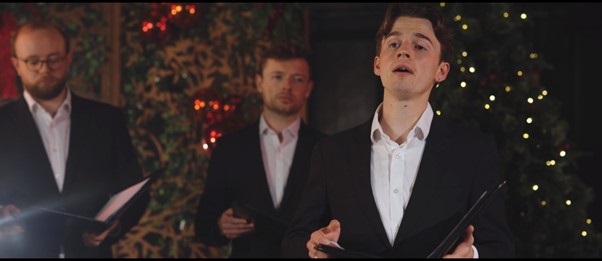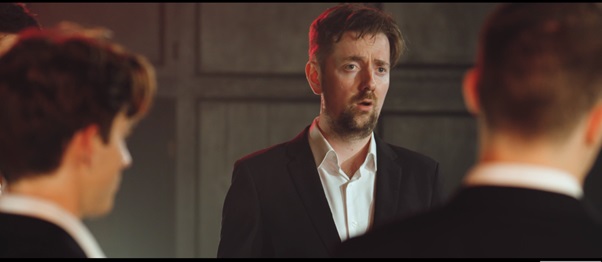The Gesualdo Six performed at the very first LIVE from London festival, back in the summer of 2020 presenting music associated with the Compline service, the works linked by a theme, ‘Fading’ – quiet but soothing music during what were troubled times. This Christmas they have returned to the festival with a programme of music, old and modern, inspired by the season of Advent.
To begin, they went back to the 16th century. Giovanni Pierluigi da Palestrina’s Matin Responsory is well-known, in the arrangement made by David Willcocks for King’s College Cambridge and performed there every Advent. The Gesualdo Six relished the contrast between the solo voice plainchant, penetrating and intense, and the rich flowering of the four-voice responses, highly coloured and often sound quite ‘modern’ in their vividness and immediacy.

Orlande de Lassus’s Conditor alme siderum (Gracious creator of the stars) followed, a setting of an anonymous text, dating from the 7th century, which was traditionally used at Vespers during Advent, and which appeals to ‘Christ, Redeemer of all’ to ‘hear Thy servants when they call’. Lassus adopted the alternatim practice of a former age and varied the number of voices for each stanza. Again, the juxtaposition of the very individual colour of solo voices and the blended unity of the full ensemble imbued the reflections of the text with vitality, countertenor Alasdair Austin’s beautifully phrased opening plainsong leading to the silky, sumptuous flow of the five voices, before a retreat in the second plainchant verse, sung with flawless intonation and nuance by Owain Park (director and bass), Josh Cooter (tenor) and Michael Craddock (baritone). The voices of Austin and Joseph Wicks (tenor) danced freely around each other in the fourth verse. Throughout the unity of conception and delivery was impressive.
There are at least fifteen settings of Martin Luther’s text, ‘Nun Komm, der Heiden Heiland’ (Now come, Saviour of the heathen). Here we had the imitative rhetoric of Michael Praetorius, and The Gesualdo Six created a sense of expansiveness, Guy James’s glowing countertenor reaching upwards lustrously against the deep grain of Park’s full bass, the imitation pointed but never mannered or fussy. Homophony and harmoniousness sealed the certainly of the resolution: ‘so that the world marvels/ that God ordained such a birth for Him.’

There was more Palestrina later in the programme: O magnum mysterium, in which the wondrous aura surrounding the birth of Christ was conveyed by the seamless interplay of the two groups of three voices, the imitation rolling like waves mid-ocean, the surface movements shifting above profound depths. The verse-closing Alleluias had tremendous vigour and lift. The anonymous carol ‘Es ist ein Ros entsprungen’ was published in 1599 but it was Praetorius’ four-voice arrangement of it twenty years later for his Musae Sioniae that made it well-known. It’s a VOCES8 Christmas staple, but The Gesualdo Six matched the mastery of their hosts with a beautifully blended rendition which treated the text with care.
Moving to the start of the 20th century, the ensemble offered familiar settings by English composers. Gustav Holst’s four-voice setting of Christina Rossetti’s ‘In the bleak midwinter’ told an old story with freshness, Park’s thoughtful leading of the cadences guiding the narrative engagingly. In the third stanza the sudden rush of richness of the full six voices was warming, and the singers pushed through the enjambed lines, creating a sense of growing excitement. The questions of the single worshipper, ‘What can I give Him,/ Poor as I am?, in the final verse were sung with tenderness, conveying humility, by Guy James.
Park’s arrangement of Ralph Vaughan Williams’ The truth sent from above, sometimes known as the Herefordshire Carol, brings harmonies rich and strange to the familiar folk melody. Baritone Michael Craddock was an eloquent soloist, gentle at the opening, more intense in the final verse. In between, above warmly hummed support, Josh Cooter and Guy James took turns to float about the twisting harmonies which seemed to be searching for God’s grace, reaching towards the final plea:
‘God grant to all within this place
True saving faith, that special grace
Which to his people doth belong:
And thus I close my Christmas song.’

The rhythmic rhetoric of the anonymous Advent antiphon Angelus ad virginem was wonderfully projected, the phrases springing forward, suggesting rebirth and new hope – ‘Let Him wash away our sins,/ Giving us help,/ To enjoy the blissful life,/ After this exile’ – while old and modern came together in the Latvian composer Eriks Esenvalds’ O Emmanuel, the solo alto Gregorian chant framing gently shifting chordal clusters that evoked calm and reassurance.
Judith Bingham’s In Mary’s Love inspired a sense of awe, individual voices coming to the fore then sinking back into the ensemble fold, contrasts of stillness and vigour, simplicity and complexity, tellingly exploited. The sudden strength of ‘Crown the sky with gleaming star, angels filled the void with joy’ surged thrillingly, and throughout the words were skilfully used as a springboard for the musical arguments. Park’s psalm-setting, O send out thy light, sent swelling harmonies and textures into the church of St Anne and St Agnes, the sound an embodiment of God’s embracing light, before the gentleness of the imitative entries and harmonic clusters over strong pedals conveyed the journey implied in the second line of text, ‘and bring me unto thy holy hill, and to thy dwelling’, finally arriving at the deeply satisfying security of the concordant resolution.

The 400th anniversary of the death of William Byrd was celebrated with the composer’s Rorate Caeli. When Shakespeare penned Portia’s speech in The Merchant of Venice, telling us that ‘The quality of mercy is not strained;/ It droppeth as the gentle rain from heaven’, he might have had the beautiful opening of Byrd’s lively introit in mind: ‘Drop down ye heavens, from above, and let the skies pour down righteousness.’ There often seemed to be many more than six voices intertwining, but textures and counterpoint were unfailingly lucid. The dynamism of the appeal, ‘Benedixisti, Domine, terram tuam: avertisti captivitatem’ (Jacob. Let the earth open and bring forth a Saviour) was bracing, and juxtaposed with the rooted forthrightness of the declaration ‘Gloria Patri, et Filio, et Spiritui Sancto’, and the flowing certainty of the close: ‘et nunc, et semper, et in saecula saeculorum. Amen’ (is now, and ever shall be, world without end. Amen).
Two arrangements by Philip Lawson, a former member of the King’s Singers brought the programme to a close. In the folk-like Maria durch ein dornwald ging the alternating solo voices were supported by a lovely gentle bed of subtle interweavings, the ‘Kyrie eleison’ refrain a reverential prayer, conveying both sincerity and joy. The ensemble’s unwavering pitch-perfectness and ensemble discipline made a real impact in Veni, veni Emmanuel.
The Gesualdo Six sing old and modern with equal insight and artistry. One wonders if they might have interpolated some repertory from the intervening years? But, this was a satisfying seasonal programme performed with skill, professionalism and earnestness.
LIVE From London: Christmas 2023 concerts are available until the end of 7th January 2024.
Claire Seymour
The Gesualdo Six: Alasdair Austin (countertenor), Joseph Wicks (tenor), Owain Park (director and bass), Josh Cooter (tenor), Michael Craddock (baritone), Guy James (countertenor).
Giovanni Pierluigi da Palestrina (1525-94) arr. David Willcocks (1919-2015) – Matin Responsory; Orlande de Lassus (1532-94) – Conditor alme siderum; Michael Praetorius (1571-1621) – Nun Komm, der Heiden Heiland; Trad. arr. Ralph Vaughan Williams (1872-1958) & Owain Park (b. 1993) The truth sent from above; Palestrina – O magnum mysterium; Gustav Holst (1874-1934) In the bleak midwinter; Eriks Esenvalds (b. 1977) O Emmanuel; Anon. – Angelus ad virginem; Trad. arr. Michael Praetorius – Es ist ein Ros entsprungen; Judith Bingham (b. 1952) – In Mary’s Love, Owain Park – O send out thy light; William Byrd (1543-1623) – Rorate Caeli; Trad. arr. Philip Lawson (b. 1957) – Maria durch ein dornwald ging, Veni, veni Emmanuel
The Church of St Anne and St Agnes, City of London, Live from London (live stream).